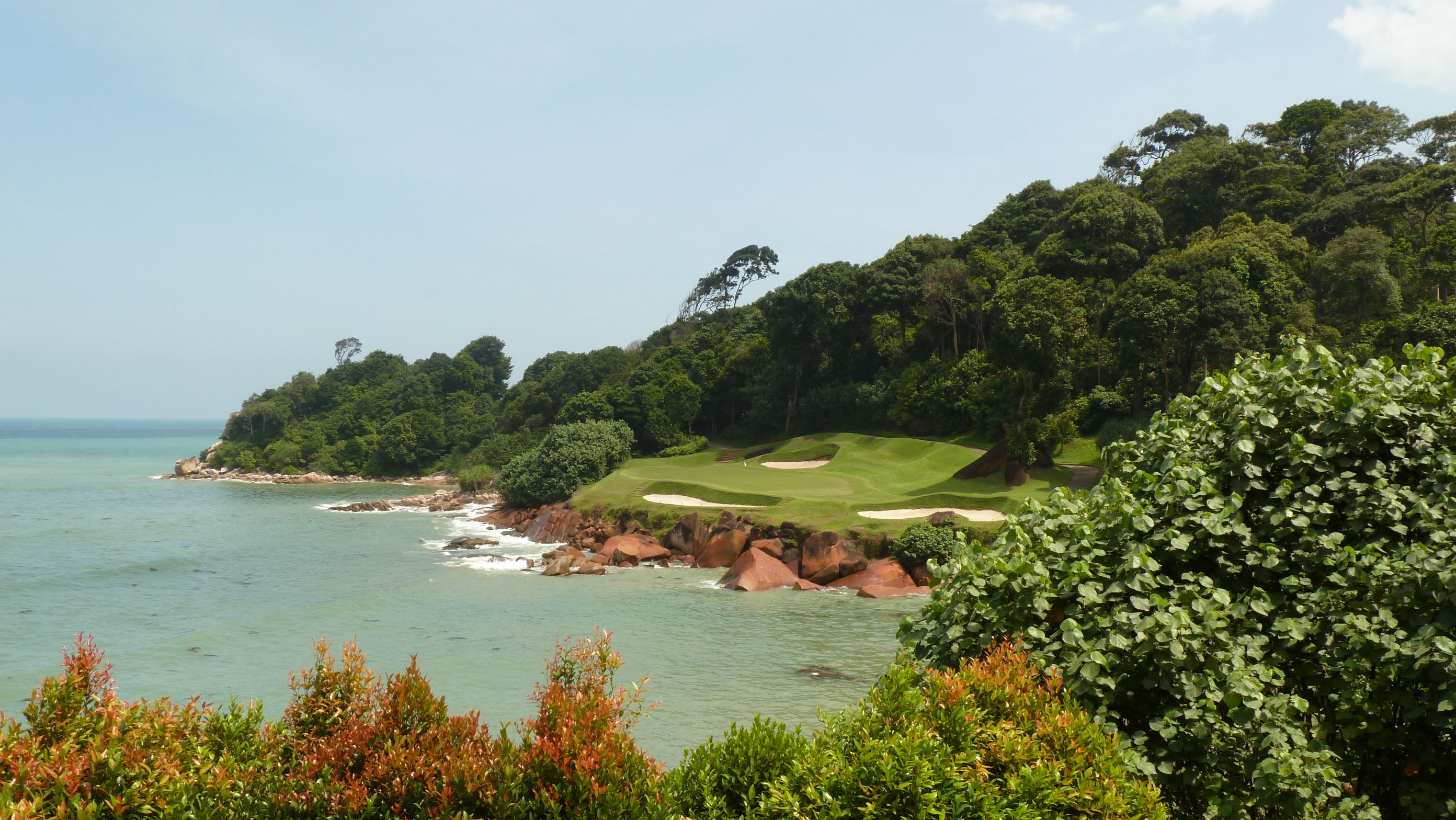
Location: Bintan Island, Indonesia
Established: 1998
Architect: Gary Player
First Played: 27th Nov 2010
Last Played: 27th Nov 2010
Work colleagues had always said playing in Singapore was very expensive. After a few rounds at various clubs I totally agreed. Most locals travel to Malaysia or Indonesia as it is a bit cheaper. I researched some of the various clubs, finding Ria Bintan Golf Club, a Gary Player designed course. There was one hole in particular that looked spectacular, which convinced me the trip had to be made one day.
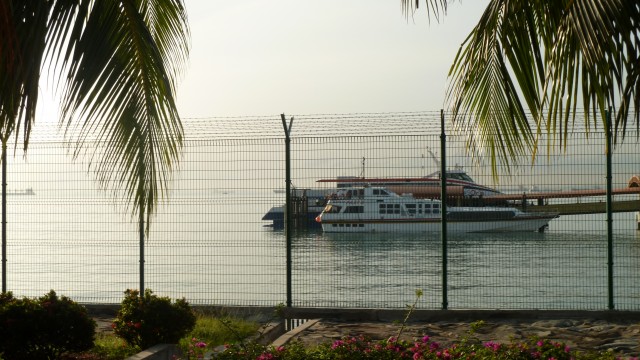
Ferry from Singapore
Arriving to the ferry terminal in Singapore with not much time to spare, after a very scenic drive around the prison and airport, due to the taxi driver not knowing the way. I had some pre-conceived ideas of a rickety old ship, full of people and animals. How crazy my thoughts where, when I found a very modern catamaran vessel, which took just under an hour to make the journey across safely and comfortably.

Arriving on the island
A nice welcome sign greets you getting of the ferry before hitting immigration. I took hardly any money, expecting to pay everything by credit card. One thing I didn’t count on was the money required for the visa entering Indonesia. This had to be paid in cash, which I was lucky to bring just enough. More scary was the fact that the officials took your passport, which would be returned just before leaving, to assist in speeding up the process.
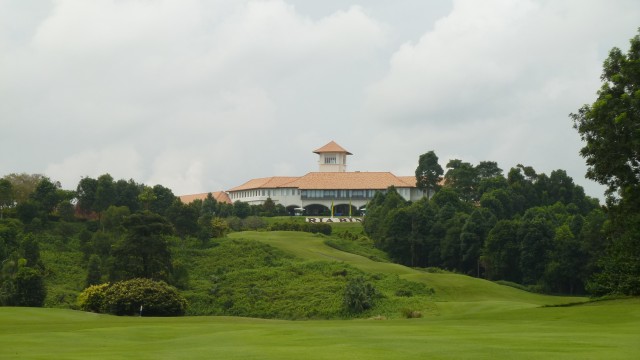
The Clubhouse sits looking over the course
With an organised transfer from the ferry to the golf club, we arrived with a bit of time before the tee off. I decided to sit in the outdoor area of the clubhouse, for a bit of breakfast, which some great Asian food on offer.
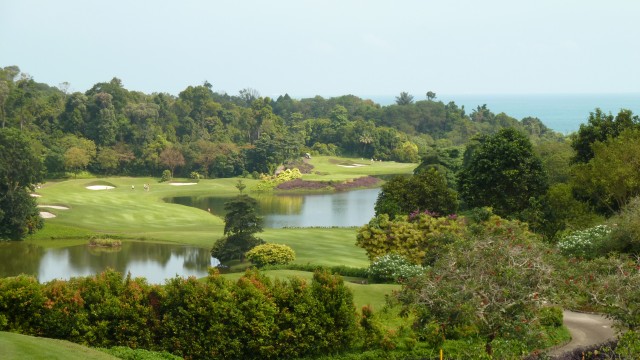
View from the clubhouse
With a spectacular view overlooking the first couple of holes and out to the sea, it certainly made the wait before the round more breathtaking.
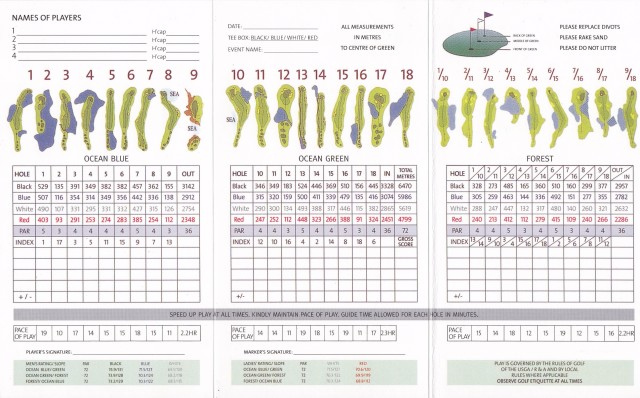
Scorecard for Ria Bintan Golf Club
There are actually 27 holes on the course, with the most popular being the Ocean course, which is what I would be playing. Play was from the blue tees for the day.
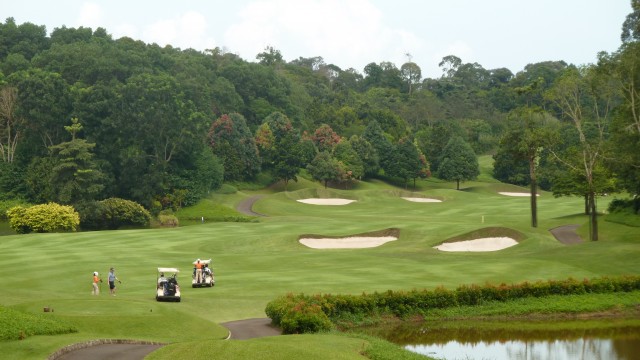
Hole 1 – 507 meter par 5
Starting the round is the longest and hardest hole on course, which doglegs to the right. From an elevated tee, water is located right, but only in play for a really duffed shot. More thought needs to be made for the bunkers right, whether to carry or play around, or the water left.
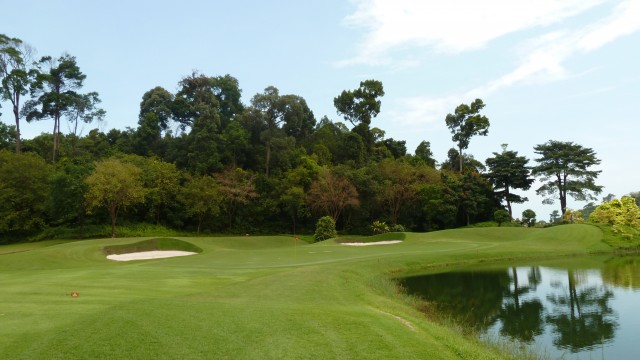
Avoid water next to the 1st green
For the approach, there is further risk, with a narrowing fairway narrows with water right and bunkers to the left. The hazard protects rear pin positions, but allows a narrow passage from the front. A testing hole to begin the round, certainly asking questions from the outset, but with various options available for differing strategies. Plenty of risk or reward for each shot.
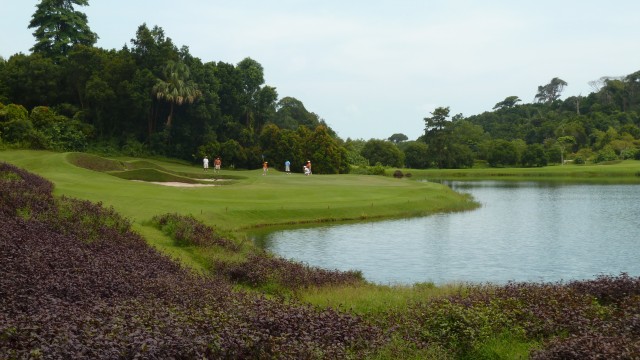
Hole 2 – 116 meter par 3
Next is the shortest hole on course, starting a string of holes with water in play. To reach the green a small carry is required over dense scrub and the edge of the water.
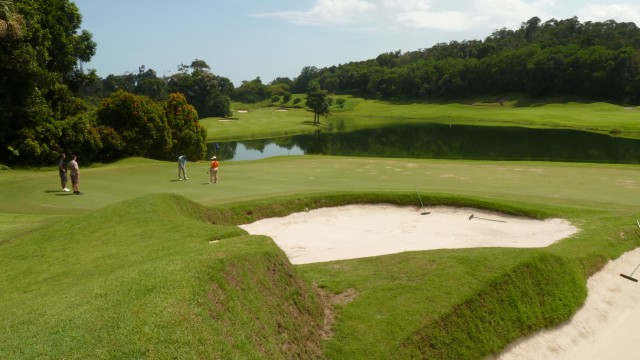
Well protected 2nd green
The green is quite long, but not overly wide, squeezed between the sand and water. Parts of the putting surface slope towards the water, making shots from the opposite bunkers that more difficult. Certainly not the most difficult hole, but usually the shorter ones through in a surprise or too for not being accurate.
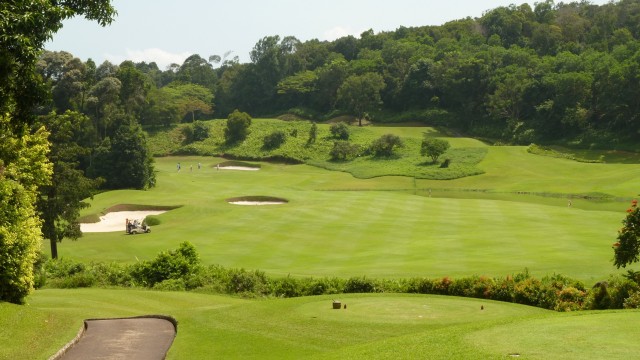
Hole 3 – 354 meter par 4
A narrowing fairway, the further the ball carries. Jungle down the left and water right, whilst a central trap needs to be carried if playing straight at the hole.
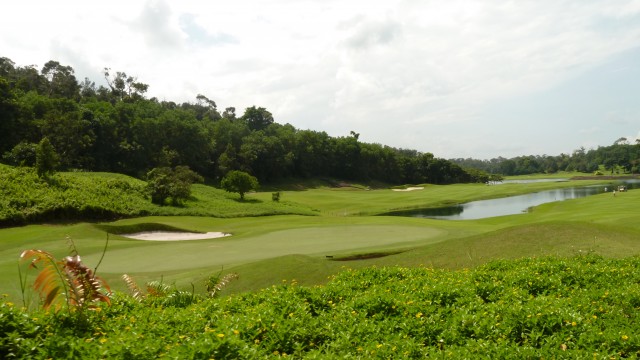
Long narrow 3rd green
Play is to an elevated green, where the putting surface itself is quite narrow, but long, with two large traps are either side for slightly misdirected balls. There is a small slope between two subtle tiers, requiring accuracy with the approach. A hole offering a bit of strategy from the tee, leaving those being aggressive with higher risk.
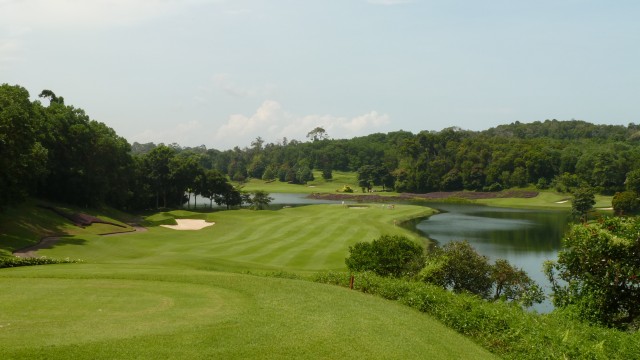
Hole 4 – 314 meter par 4
The shortest par 4 on the course, plays from an elevated tee, with water down the right of the fairway. A solitary bunker sits to the left, but the fairway is quite generous in the landing area. A few humps and hollows are found along the way to the green, ensuring some awkward stances may be found.
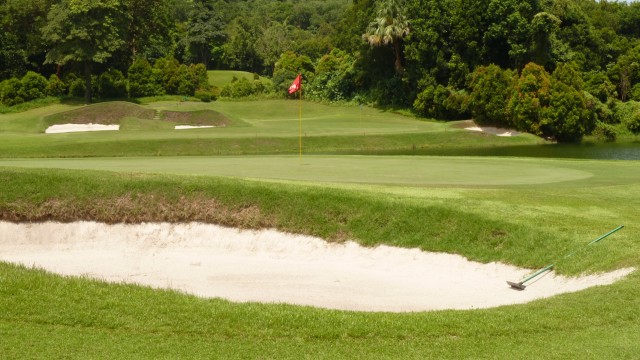
Central bunker protecting the 4th green
With water found all around the green, bar the front, there are many pin positions available due to its width. A central bunker almost divides the green in two, which will leave some interesting shots if playing to the wrong side. Simple design and look, but offers a lot in the way it can be played, from the tee to the green.
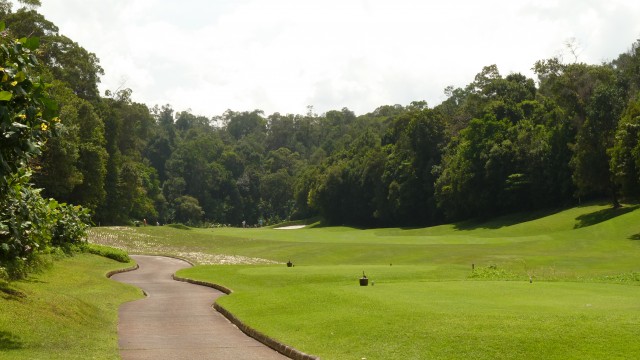
Hole 5 – 349 meter par 4
Playing up a slight incline, is this medium length par 4. From the rear tee, water is slightly to the right, but shouldn’t be in play. The fairway is narrower than previous holes, but also lined by dense jungle on both sides, playing fairly straight up to the green.
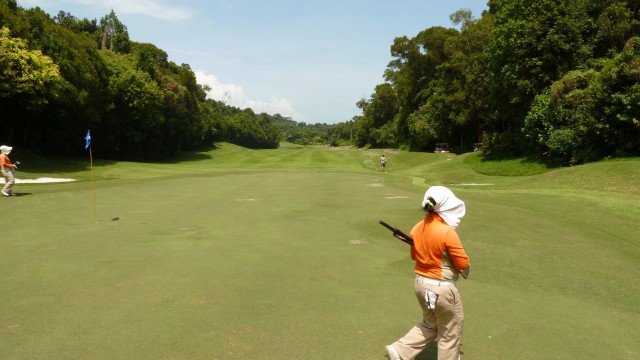
Looking back from the 5th green
Again the green is quite narrow, but widens at the rear. Traps are either side at the front, with the green sloping from the rear. This hole is more about accuracy and a bit one dimensional. Probably the weakest hole on the front nine.
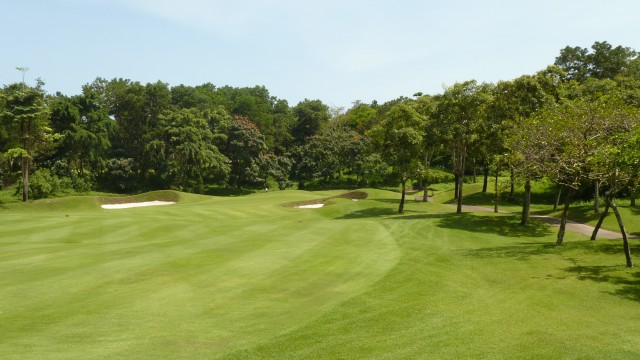
Hole 6 – 356 meter par 4
Another medium par 4 follows, which has a slight dogleg to the right. A large trap and some trees come into play if trying to shorten the hole, but those playing safe have ample room to land the tee shot.
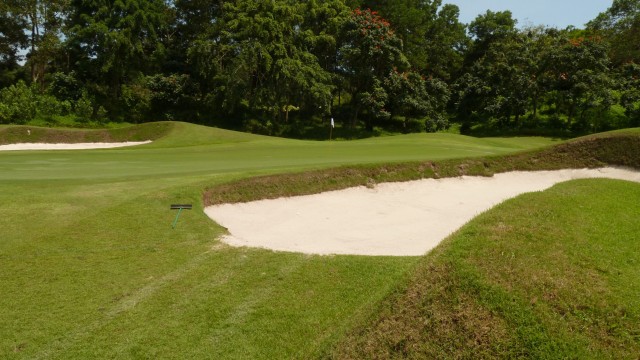
Narrow 6th green
Two traps protect either side at the front of the green, but an opening exists to bring the ball into this narrow area. The putting surface has a gentle slope, with the bunkers being built up to add some shape to the surround. In fact this is a common thing on a lot of the holes. Options available from the tee, but the approach needs to be accurate due to its small size.
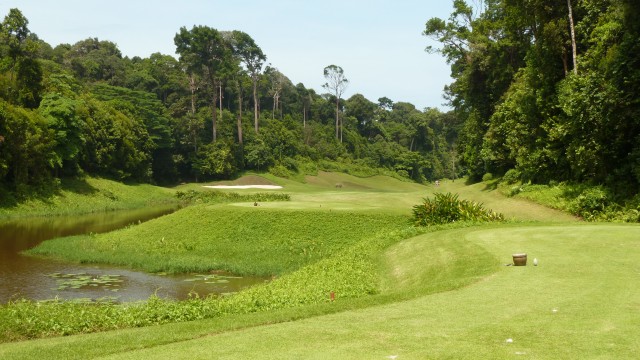
Hole 7 – 442 meter par 5
The first hole in a run down to the sea, is the shortest par 5, which is also the easiest of the 3 shot holes. Play here is to a slight bend to the right, with the ideal shot moving left to right. The teeing areas bring water into play with a small carry, but a more in view for intimidation than anything else. A bunker to the left will prevent reaching the green in two.
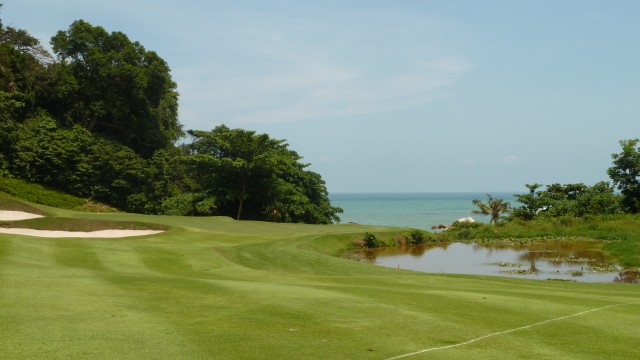
Approach to the 7th Green
Once you have gone around the slight turn on the hole, a great scene comes into view, with the green sitting beside a small water hazard, with the sea beyond in the background. Attacking with the second shot will be high risk, with two traps to the left, water right, and scrub beyond the green. But reaching the green in two, will offer a possible eagle or easy birdie. For most people a short approach will be left for the third shot. One of my favourite holes on the course, making you think about every shot.
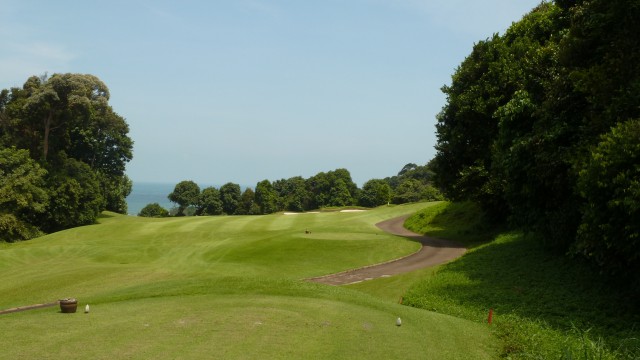
Hole 8 – 336 meter par 4
Next is a sharp dogleg left hole. Playing the safe line, involves a mid iron shot to the visible fairway, with a couple of bunkers found in the run out area. For those wanting to attack the corner, the fairway falls away down to the green, but this area is quite narrow. There is huge risk and I question whether the reward is worth it.
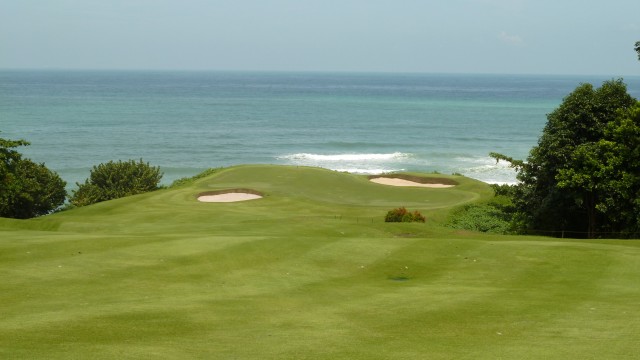
View down to the 8th green
Approaching the green is down a steep slope. The green sits perched out with the sea surrounding. Spectacular view, but leaves an interesting approach. A bunker front left and rear right, leaves an angled green, where the rear rises steeply. Another memorable hole, where many options are available both from the tee and approach.
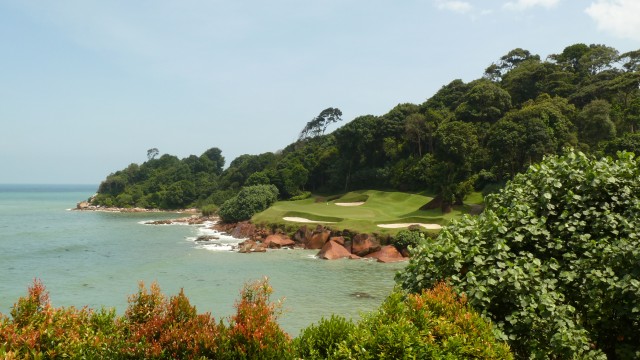
Hole 9 – 138 meter par 3
Finally it arrived. The whole reason I chose to come to Ria Bintan. A spectacular par 3 which plays across part of the South China Sea. This is only a medium length hole, but it is all carry to reach the green. Yes a penal hole, but certainly one which gets the blood pumping.
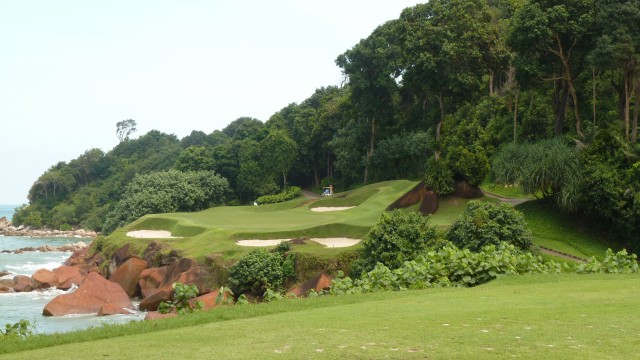
View from the 9th tee
Bunkers are found on most sides of the putting area, with rocks and water beyond them. A large tree is found right, which prevents trying to find the safe side of the hole, although there is a small area short of this available. The putting surface has a strong slope from the rear to front. The mounds and hollows to the side will leave an interesting shot if playing out to the right, trying to keep away from the water. Really this is not an overly difficult hole, as long as you can carry the ball 110 meters. It is all in the mind.
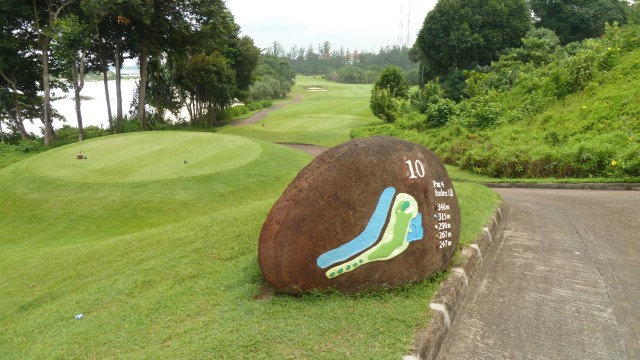
Hole 10 – 315 meter par 4
The last hole before moving away from the sea, is this short par 4. With a gentle dogleg to the left, water runs the entire length down this side, but is not really in play. Those trying to hit a long tee shot bring water into play out to the right, where the turn begins, as there is a chance to find yourself running out of runway.
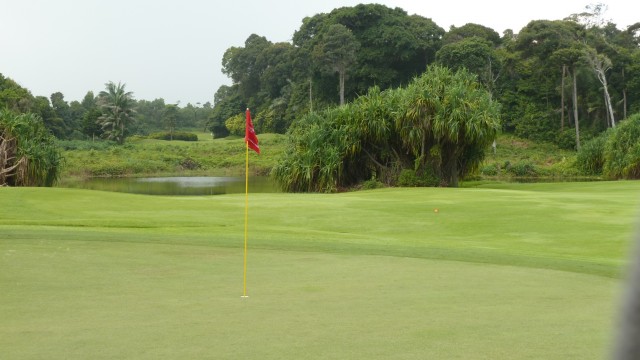
Looking back from the 10th green
The green angles away to the right, but is quite small. Making this more difficult is the five bunkers around the outside. There are some stronger slopes on this green. It was here my caddy suggested a line for my putt, which I couldn’t see and looked totally opposite to what I was seeing, so trusted my own judgement. Note to self, listen to the experts who are on the course most days. A nice hole with a few challenges, starting the back nine.
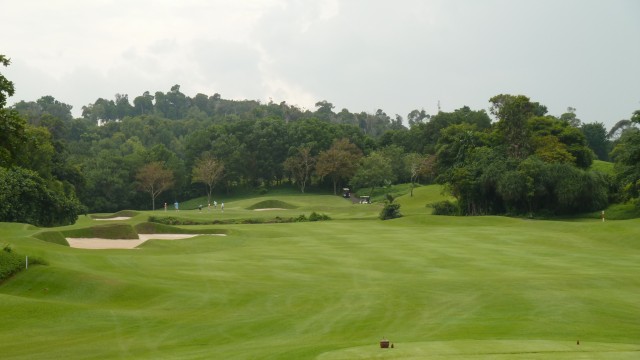
Hole 11 – 320 meter par 4
Another short par 4 with a slight angle to the left, but one which requires a tee shot to the fairway. Sand is found either side of this wide fairway, but it is the hazard running the entire width closer to the green, which may cause issues. If you find yourself in a difficult position, trying to carry this could lead to disaster.
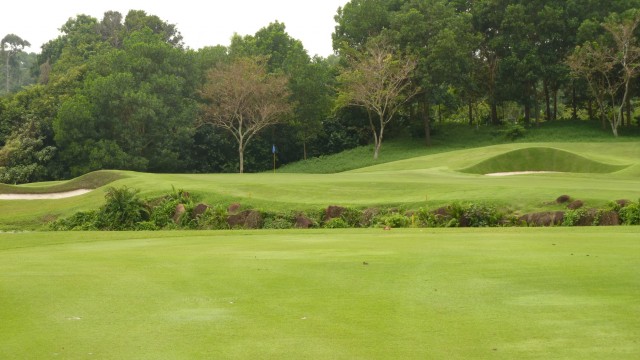
View of the 11th green
With traps either side, the putting surface slopes away to the front and rear from a central spine. Nice short hole, which is quite open, but requires a bit of thought from the tee shot.
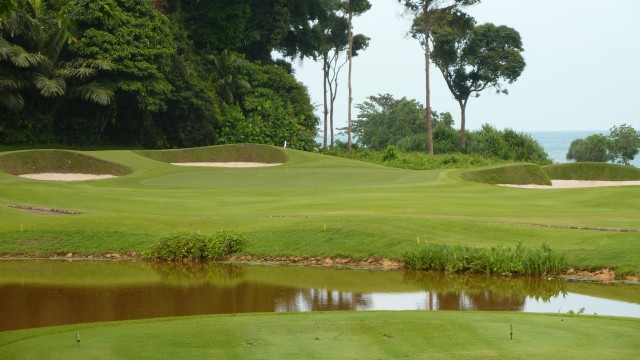
Hole 12 – 159 meter par 3
A medium length par 3, which requires a carry over a water hazard. This really shouldn’t come into play as it is back quite some distance from the green. This won’t comfort those who have a total fear of water however.
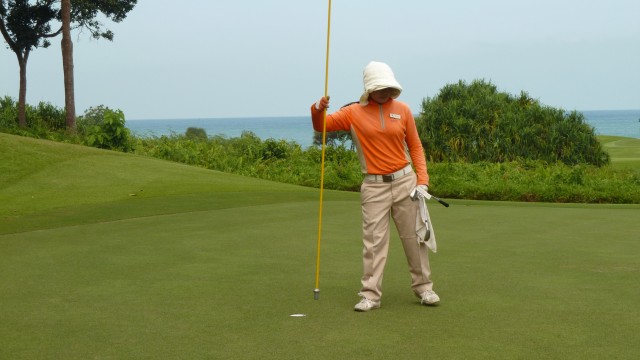
Caddy on the 12th green
The green complex has three traps around it, with the left built into a hill. The putting surface slopes from the middle away to the front, whilst the rear is slightly flatter. Nice hole, due to the view behind of the sea and jungle to the right. Play wise, quite forgiving, with a lot of open area between the water and the green, however missing either side will lead to trouble.
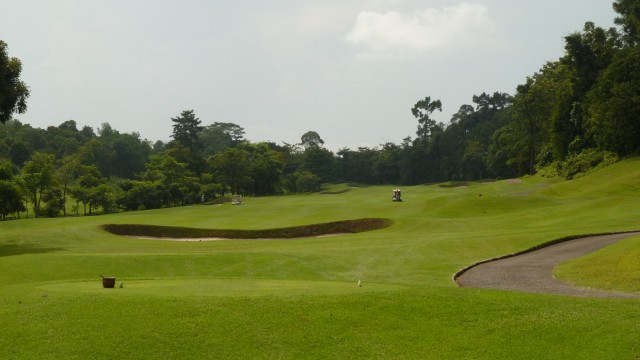
Hole 13 – 500 meter par 5
A long par 5 follows, which plays with a slight turn to the left. A misplaced bunker is located in front of the tees, not really sure why it is there as it does not add anything to the hole. A water hazard runs along the left, coming more into play for the second shot.
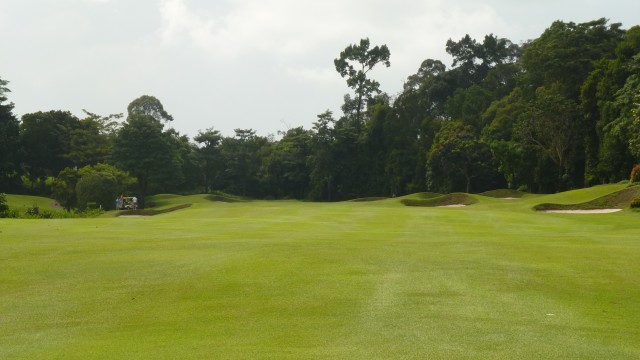
View from the 13th fairway
Traps are located either side getting closer to the green, with the fairway narrowing. These have been built to add a bit of shape to the fairway, which would otherwise look quite flat, but also help to deceive the view to the green. Nice hole which tests from the second shot on, requiring a little bit of accuracy.
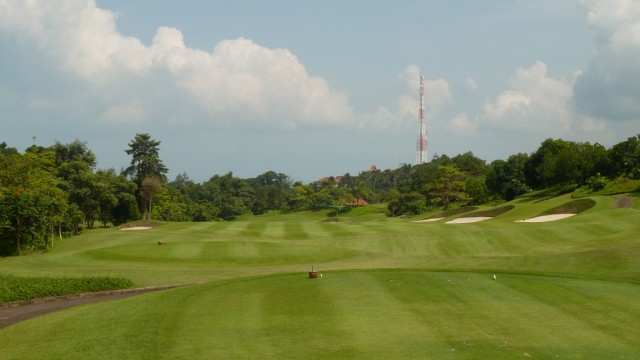
Hole 14 – 411 meter par 4
A long par 4, playing dead straight. From the tee, play is over a small hill. Either side of this are sand traps, although with quite some width, a few of these should not come into play. Water runs the entire left side to the green.
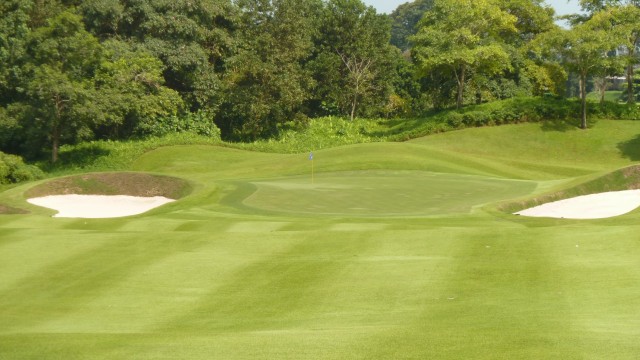
Approach downhill to the 14th Green
Those long enough may gain a little distance by reaching the down slope of the fairway. The fairway narrows quite a bit on this side, leading into the hole. Two traps are found at the front of this green, with the putting surface having quite a bit of contour. A few mound and hollows surround the area, allowing the player to show off there chipping skills. I am still unsure how I feel about this hole. I think it is the fact it is dead straight which doesn’t make it sit favourably. In contrast to the various use of slopes and the green complex increase the variables of play.
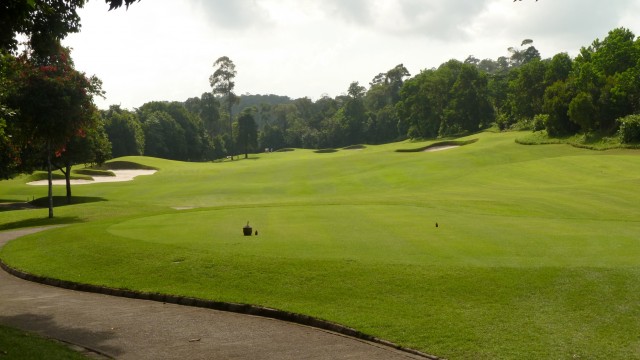
Hole 15 – 339 meter par 4
Starting the final run back to the clubhouse, is this medium length par 4. Again playing almost straight, the use of sloping across the hole, help to create some interest. Bunkers are located either side which may catch the tee shot. Play from the center of the fairway is the ideal line for the approach, due to the trees short left, and bunkers right of the green.
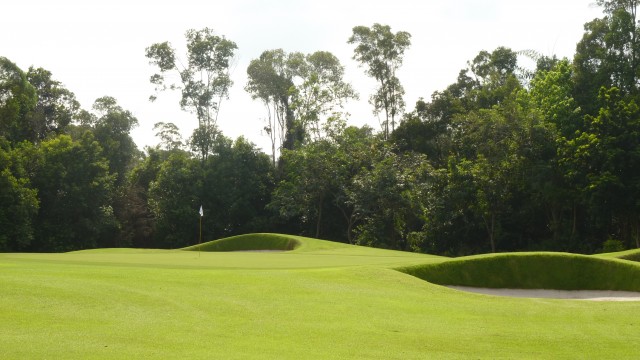
View of the 15th green
Play from the center of the fairway is the ideal line for the approach, due to the trees short left, and bunkers right of the green. Not the most exciting hole on the back nine.
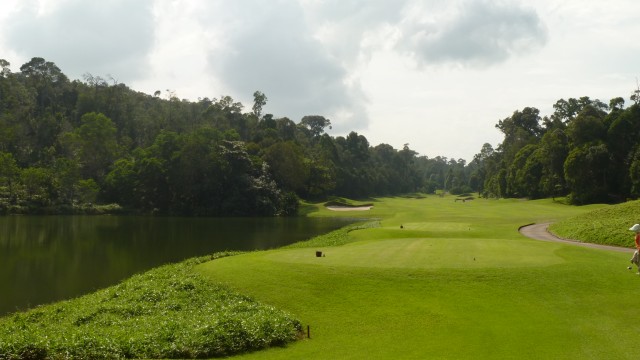
Hole 16 – 479 meter par 5
The last of the long holes for the day, this hole plays relatively straight, a bit like the previous two. Water is found to the left with traps beyond this. I thought the water would not really be in play with such a wide fairway, but one of my partners proved me wrong. Golf surely is an unpredictable game.
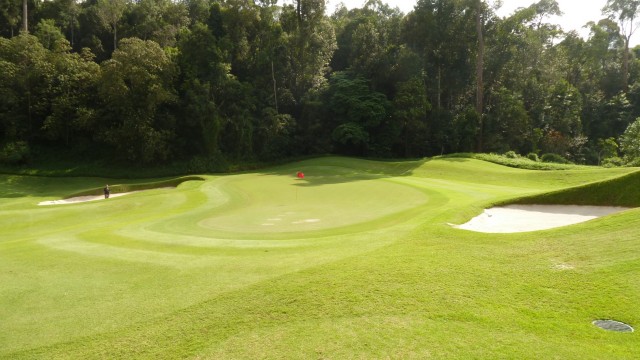
Looking down at the 16th green
A bunker is located short right of the green, deceiving the distance to the hole, whilst another two are located either side. The rear of the green complex slopes away, with the putting surface sloping towards the front. The green is shaped like a kidney, angling away to the left. Playing up a gentle slope, this will play as a true three shot hole.
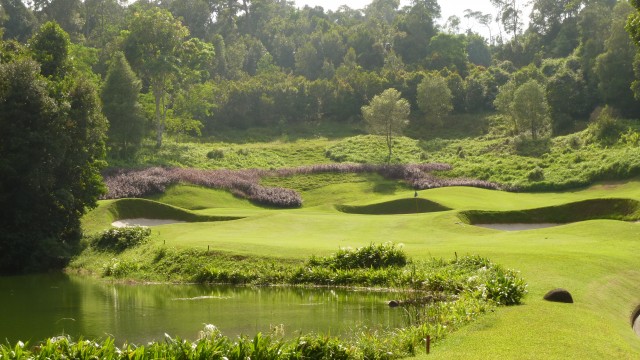
Hole 17 – 135 meter par 3
Two strong holes come into play finishing the round. The penultimate hole is the easiest on the course, but don’t hold that against it. From an elevated tee, a gully must be carried, containing a water hazard. With two traps protecting the front, whilst another is found rear, the front area slopes away from the green.
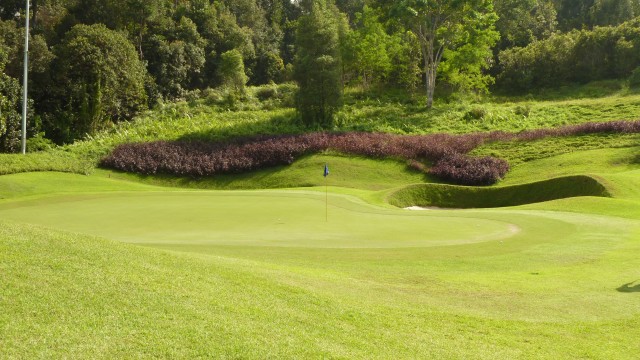
Looking across at the 17th green
The one positive, there is ample room and a plateau before reaching the water. A very wide putting surface, doesn’t punish those slightly misdirected, but a narrow green will punish those not hit to the correct distance. The green slopes from each side towards the middle, whilst also sloping back towards the front. Although a similar distance to the ninth, these play totally differently.
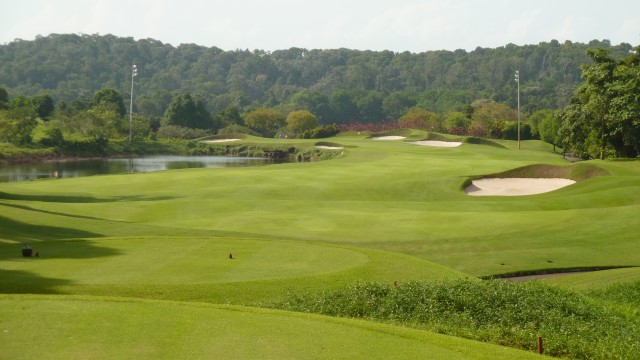
Hole 18 – 416 meter par 4
Finishing the round, is the longest par 4 on the course, with a dogleg to the left. The elevated tee will assist in shortening the distance of this monster, but finding the water left or bunker right will punish. Being fairly wide, there is ample room to land the ball. Ideally carrying the right bunker will lead to the best line into the green.
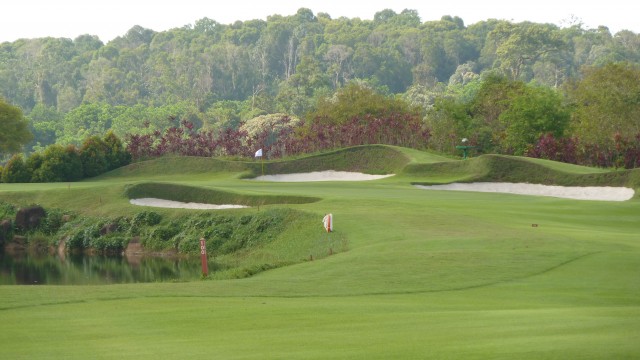
Carry the corner to the 18th green
Water may come into play making the approach to the 18th green, hopefully the last challenging shot for the round. A trap is located at the front, which may hopefully save some from rolling into the drink, with two large traps at the rear. These might cause heart palpitations as the shot is back towards the water. With a another long narrow green, finding the wrong portion will leave a difficult putt. Certainly one of the more challenging holes I have encountered to finish a round and might change the outcome of a match or two.
In summary, it was a great experience making the journey to Ria Bintan Island and playing golf. The course was typical for Asian locations, with minimal run on the fairways and the rough quite thick. I did find the greens to be firmer than expected and slightly faster than other courses I had played within the region. This was an unexpected, but pleasant surprise.
There was a decent variety in how the holes had been designed, mostly. Some seemed a bit contrived, especially where smaller mounds had been created on the flatter areas, to give a false links feel. A more gentle sloping approach looks much better on this style of course, especially since parts are located within the forest. The course is not going to win awards for great architecture, but it is a good resort course, where players of all levels can enjoy a game.
Looking at the course makeup:
- Hole Directions – There was a good variety allowing for conditions to have wide ranging effects during play. An even breakdown was found facing in all directions. Hole 16 had a westerly facing tee, which may have issues late in the afternoon with sun
- Hole Lengths – Par three holes had a good variance in distance, the majority in mid length, although two were seperated by 2 meters but played quite differently. Par four holes had a great variation, ranging from short to long with the majority being mid length. There were however a couple of consecutive par 4 holes where the distance was similar. Par 5 holes ranged from mid to long with the latter being the majority
- Hole Layout – There was a decent mixture in how the holes played, with an even split between those turning left and right, where two shots or more were required to reach the green. This helps to ensure one style of play is not favoured over another.
Overall I am glad that I made the trip, as it was a pleasant experience playing the course. I have played a couple in Singapore, which have not really left me walking away feeling like I have truly enjoyed the course.
The only main issue I experienced, which was outside of the golf, was the queue for a taxi upon returning to Singapore. Arriving back early evening, the ferry terminal is quite remote, so unless you hire a car, taxi is the only way to return to the city. Luckily I found a private car available, which I shared with some expats who were desperate to get the children home to bed.
How to play at Ria Bintan Golf Club:
1. This is a publicly accessible golf course. You can do a day trip by ferry from Singapore or stay on the island

